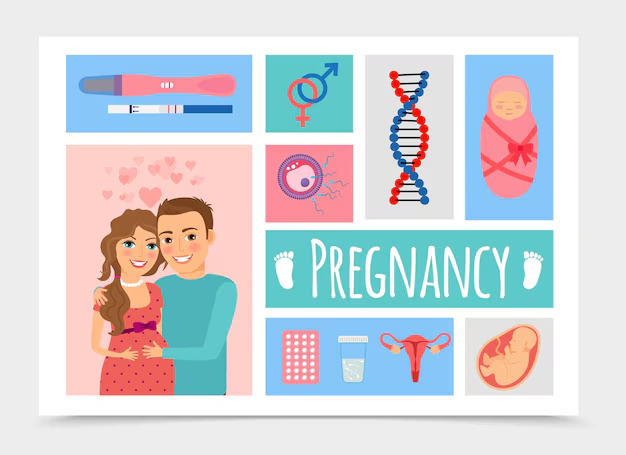The process and sequence of changes in a woman’s organs and tissues as a result of a developing fetus. (For pregnancy other than humans, see Pregnancy.)
Pregnancy is not a tough period if you enjoy it. It’s the most precious time for the mothers, because, they are giving birth to child. For getting healthy baby, you must take care of yourself. Healthy pregnancy means healthy baby. Eat a variety of healthy foods, vegetables, whole grains and protein. Focus on foods that are low in added sugar, sodium, and saturated fat.
Include fruits, vegetables and proteins. Avoid processed foods and limit sugar. Drink plenty of water every day.
Follow these simple tips for a smooth pregnancy:
Medical care and testing during pregnancy
During your initial appointment, your doctor will probably do a pregnancy test. After that, a medical examination will reveal how many weeks you are pregnant. Your delivery date will also be predicted using this information. An ultrasound performed after your pregnancy will help confirm this date.
When you’re healthy and don’t have any complicated risk factors, the majority of medical professionals will wish to see you:
Every four weeks until the 28th week of pregnancy, then every two weeks for the next thirty-six weeks, and finally once a week till delivery

Take Prenatal Vitamins
To reduce nausea, take them with a meal. Your doctor can recommend a brand with all essential nutrients tailored to your needs.
Folic acid, iron, and calcium. Consult your doctor for the right supplements. Pregnancy increases nutrient needs, which diet alone may not meet. Prenatal vitamins fill these gaps.
Exercise Regularly
Regular activity reduces fatigue and keeps you energized throughout the day. Exercise enhances blood flow, reducing swelling in your legs and preventing varicose veins. Building strength and endurance prepares your body for labor and helps with postpartum recovery. Gentle exercises like walking or prenatal yoga improve circulation and reduce stress. Avoid strenuous activities.
Rest Well
Sleep allows your body to focus on the baby’s development, especially during the early stages.
Rest lowers stress levels, which can affect your health and pregnancy. Quality sleep strengthens your immune system. Sleep helping you fight off illnesses. Rested muscles and a relaxed mind help you cope better during labor and delivery. Sleep helps regulate pregnancy hormones. Sleep help reducing mood swings and promoting emotional stability. Get 7-9 hours of sleep. Use pillows for comfort and take short naps if needed.
Avoid Harmful Substances
Stay away from alcohol, smoking, and drugs. Limit caffeine intake. Smoking or exposure to secondhand smoke reduces oxygen supply to the baby. Alcohol in small amounts can harm a baby. It increases the risk of fetal alcohol spectrum disorders (FASDs), which affect physical and mental development.
Attend Prenatal Checkups
During your initial appointment, your doctor will probably do a pregnancy test. After that, a medical examination will reveal how many weeks you are pregnant. Your delivery date will also be predicted using this information; an ultrasound performed after your pregnancy will help confirm this date.
Manage Stress
Practice relaxation techniques like deep breathing or meditation. Seek support from loved ones. Combines gentle stretches and mindfulness, easing tension. Exercise boosts endorphins, your body’s natural stress relievers. Activities like walking and swimming help clear your mind. Proper nutrition supports your body and mood.
Educate Yourself
Learn about childbirth and parenting. Attend prenatal classes if possible. thoughtful your pregnancy helps you make well-versed decision and reduces. Prepares you for childbirth and parenting. Staying informed empowers you to take control of your journey to motherhood. Learning about nutrition, exercise, and prenatal care helps you adopt healthy habits. Learning baby care basics like feeding, diapering, and soothing techniques helps you feel ready for motherhood.
Listen to Your Body
Report unusual symptoms to your doctor immediately ‘such as severe pain and bleeding. Identifying unusual symptoms early helps address concerns before they escalate. Stay positive, stay informed, and cherish this beautiful time. Rest when tired, prioritize sleep and adjust your schedule to include breaks
Benefits of Walking During Pregnancy
On foot boosts blood flow, helping to reduce bulge in the legs and feet. It can relieve back pain, reduce bloat, and improve absorption. Physical activity like walking triggers the release of endorphins, which improve mood and help reduce stress and anxiety. Regular walking helps manage weight gain during pregnancy by keeping you active without putting too much strain on the body. Light exercise, like walking, can help you sleep better at night by reducing anxiety and promoting relaxation.
How to Walk Safely During Pregnancy:
Choose supportive shoes with a cushioned sole to prevent injury. If you’re new to exercise or haven’t been active, start with short walks and gradually increase the duration and intensity. Drink plenty of water before, during, and after your walk to stay hydrated, especially in hot weather.
If you feel dizzy, short of breath, or experience any discomfort, stop and rest. Always get medical advice if you have any strange symptoms. Try to walk for 20 to 30 minutes most days of the week. It can be divided into shorter sessions if necessary.
Prepare for Baby’s Arrival:
• A birth plan outlines your preferences for labor and delivery, such as pain management and post-delivery care.
• Discuss your plan with your doctor or midwife to ensure your choices align with medical advice
• Pack essential items like comfortable clothing, toiletries, and items for the baby, such as clothes, diapers, and blankets.
After the baby is born, arrange for friends or relatives to help. They can assist with housework or baby care, giving you more time to relax and heal.
Conclusion:
Because a good pregnancy creates the foundation for a healthy baby, pregnant mothers must put their physical and mental health first. A balanced diet, safe exercise, frequent prenatal checkups, and stress management can all help moms prolong their pregnancy and guarantee the best possible growth and development for their unborn child. Consideration of the significance of relaxation, proper hydration, and abstaining from dangerous substances all contribute to a positive pregnancy understanding. You can give your child the best start in life by taking even tiny steps toward improved health. Be confident, take care of yourself, and make a lifelong commitment to yourself and your unborn child because a healthy pregnancy is a gift that will last a lifetime.









